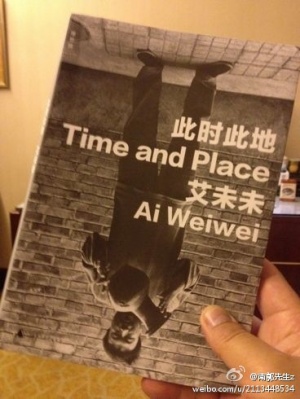“Love the future”的版本间的差异
来自China Digital Space
小 (文本替换 - 替换“Category”为“分类”) |
|||
| (未显示6个用户的26个中间版本) | |||
| 第1行: | 第1行: | ||
| − | 爱未来 | + | ==''ài wèilái'' | [[爱未来]]== |
| + | [[File:AiWeiwei.jpg|300px|thumb|right|''A [http://chinadigitaltimes.net/2011/06/future-banned-on-sina-weibo-search/#ai-weiwei sensitive] man (Weibo)'']]Reference to Chinese artist and dissident [http://chinadigitaltimes.net/china/ai-weiwei/ Ai Weiwei] (''Ài Wèiwei'' 艾未未). | ||
| − | "[http://chinadigitaltimes.net/2011/04/love-the-future-netizens-show-support-for-ai-weiwei/ | + | "[http://chinadigitaltimes.net/2011/04/love-the-future-netizens-show-support-for-ai-weiwei/ Loving the future]" became fashionable when Ai Weiwei was [http://chinadigitaltimes.net/2012/05/a-black-hood-81-captive-days-for-ai-weiwei/ detained for 81 days in 2011]. The code combines homophones and near-homographs to hint at Ai's name. The surname Ai (''Aì'' 艾) sounds the same as "love" (''ài'' 爱), while Weiwei (''Wèiwei'' 艾未未) becomes "future" (''wèilái'' 未来) simply by adding two small strokes to the second character. |
| − | + | The use of this code lead to the phrase "love the future" being [http://chinadigitaltimes.net/2011/06/future-banned-on-sina-weibo-search/#ai-weiwei blocked from Weibo search results] around June-August 2011. | |
| − | |||
| − | Chinese police | + | One of the designers behind the iconic [http://chinadigitaltimes.net/2008/01/photo-beijings-2008-olympic-stadium/ Bird's Nest Stadium] for the Beijing Olympics, Ai was prominent in the art world long before he became a thorn in the Chinese government's side. He started to rankle the authorities in May 2008 when he led a project to collect the names of children who died in the [http://chinadigitaltimes.net/2010/05/ai-weiwei-%E8%89%BE%E6%9C%AA%E6%9C%AA-commemoration-%E5%BF%B5/ Sichuan earthquake]. Active on Twitter, In February 2011 he tweeted about the calls for a "[http://chinadigitaltimes.net/2011/04/uprooting-the-%E2%80%98chinese-jasmine-revolution%E2%80%99/ jasmine revolution]" in China modeled after protests in Egypt. After receiving frequent visits from the police and seeing the destruction of his Shanghai studio in late 2010, and in the midst of a crackdown reflecting government anxieties over the Arab Spring, Ai attempted to leave for Hong Kong on April 3, 2011. He was detained while boarding his flight and disappeared for 81 days. Once back home and under surveillance, he [http://chinadigitaltimes.net/2011/07/ai-weiwei-joins-google-users-protest-true-name-policy/ didn't stay silent] for long. |
| − | + | ====See Also==== | |
| + | {{ #dpl: linksto = {{FULLPAGENAME}} }} | ||
| + | |||
| + | ==== CDT Coverage ==== | ||
| + | *[https://chinadigitaltimes.net/search_gcse/?q=Ai+Weiwei English] | ||
| + | |||
| + | *[https://chinadigitaltimes.net/chinese/search_gcse/?q=艾未未 中文] | ||
| + | |||
| + | [[分类:Lexicon]][[分类:Resistance Discourse]] | ||
2023年8月7日 (一) 05:01的最新版本
ài wèilái | 爱未来

Reference to Chinese artist and dissident Ai Weiwei (Ài Wèiwei 艾未未).
"Loving the future" became fashionable when Ai Weiwei was detained for 81 days in 2011. The code combines homophones and near-homographs to hint at Ai's name. The surname Ai (Aì 艾) sounds the same as "love" (ài 爱), while Weiwei (Wèiwei 艾未未) becomes "future" (wèilái 未来) simply by adding two small strokes to the second character.
The use of this code lead to the phrase "love the future" being blocked from Weibo search results around June-August 2011.
One of the designers behind the iconic Bird's Nest Stadium for the Beijing Olympics, Ai was prominent in the art world long before he became a thorn in the Chinese government's side. He started to rankle the authorities in May 2008 when he led a project to collect the names of children who died in the Sichuan earthquake. Active on Twitter, In February 2011 he tweeted about the calls for a "jasmine revolution" in China modeled after protests in Egypt. After receiving frequent visits from the police and seeing the destruction of his Shanghai studio in late 2010, and in the midst of a crackdown reflecting government anxieties over the Arab Spring, Ai attempted to leave for Hong Kong on April 3, 2011. He was detained while boarding his flight and disappeared for 81 days. Once back home and under surveillance, he didn't stay silent for long.
See Also
- 2011 loan
- Believe in the god Ai and be resurrected on the spot
- Crotch Central Committee
- Understand the motherland
- 爱未来




